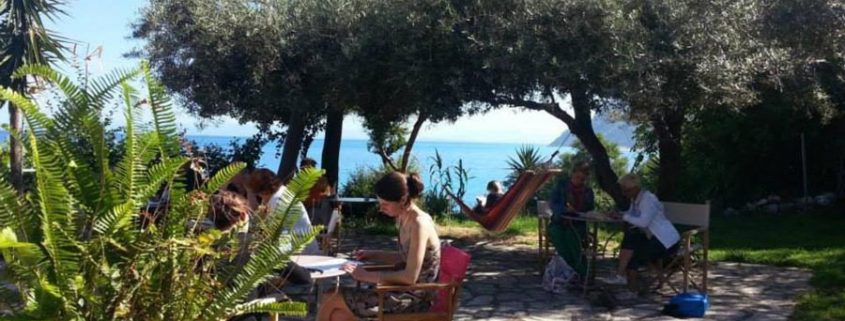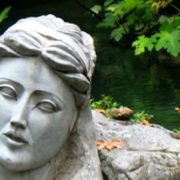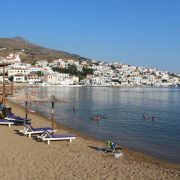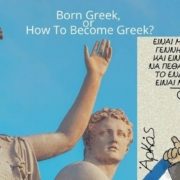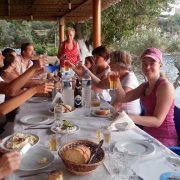On that hot July morning, the ancient olive tree with its silvery green leaves cast its shadow on the dry ground. Just like Plato some 2400 years ago, the Omilo school also gratefully used the breeze that the mighty tree offered to begin the Greek lesson of the day.
A good atmosphere is half of the work, and on a Greek island, it is easier to learn than in a classroom elsewhere in the world.
While my fellow students made themselves comfortable on their relaxing seats, I helped my teacher Terpsi with the placing of the whiteboard. Stirring with the straw of our cold frappe, we enjoyed the beautiful view of the blue sea and had recuperated enough energy to begin the lesson. I was scared to start to learn a new language but was happy to see there were so many other persons from all over the world, starting the same Greek language adventure.
A loved theme among people who have not been learning Greek for too long is learning words that exist in their own language. If you can recognize words, they are so much easier to remember!
“Give me any word and I’ll show you that it is of Greek origin», the Greeks often say. This is perhaps slightly exaggerated, although I was amazed after my first lesson.
The lesson started and Terpsi gave us a list with words ending in ‘ologist’. ‘Ology’ comes from the ancient Greek word ‘logos’, which means ‘word’ , what we in English prefer to translate into ‘the study of something’. From ‘ology’ the suffix ‘ologist’ is then derived, which indicated the person who is conducting that study. The first part of these words are usually also of Greek origin . For example : gynecologist . ‘Gynaika’ means ‘female’, so here we are talking about «someone who studies the female body». Cardiologist; ‘kardia’ means ‘heart,’ indicating a heart specialist.
By the way, we also learned that we can call our loved one ‘kardia mou,’ which literally means ‘my heart’.
*The list goes on: anthropologist comes from the word ‘anthropos’ which means ‘man’.
*You know that a dermatologist is a specialist where you go to for skin problems, but maybe you did not know that ‘derma’ in Greek means ‘skin’ or ‘leather’.
*A psychologist is interested in your “psyche “- your soul . Greeks are also masters in using cute names, and this word is affectionately used as: Psychi mou! (my soul)
*And what is a theologist? If you know that ‘theos’ in Greek means ‘god’ or ‘deity’, then you know the answer.
*Again a geologist knows all about the earth, since ‘gea’ was the Greek ‘Goddess of the Earth’.
We could still continue for a while, but the time had come for our conversation exercises! The rest of the words from the list we got along as “homework”, which I finally found the time for on my flight back home.
In the plane, my eye picked up on the chapter ‘Fovos’, which means ‘fear’. So all «phobias» have to do with fear of the word before. Hence I now understood what means ‘agoraphobia’ and ‘arachnophobia’ !
It was the first time I combined my vacation in Greece with a Greek language course and it was a thrilling experience. Not only did I advance in the Greek language but I additionally expanded my English vocabulary!
I will for sure book another course soon, on a Greek island. With Omilo of course!
Ευχαριστώ ΟΜΙΛΩ!
Vocabulary
Η γυναίκα – i gynaika – the woman
Η καρδιά – i kardia – the heart
Καρδιά μου – kardia mou – sweetheart (literal translation ; my heart)
Ο άνθρωπος– o anthropos – the human/the man
To δέρμα – to derma – the skin
H ψυχή – i psychi – the soul
Ψυχή μου– psychi moe – darling (literal translation; my soul)
O θεός – o theos – god
Ο φόβος– o fovos – the fear
Η φοβία – i fovia – the phobia/fear
Η αγοραφοβία – i agoraphobia – agorophobia (literal translation: fear for open spaces)
H αραχνοφοβία – i arachnophobia – arachnophobia (literal translation: fear of spiders)
H αράχνη– i arachni – the spider
Ευχαριστώ– efcharisto – thank you

